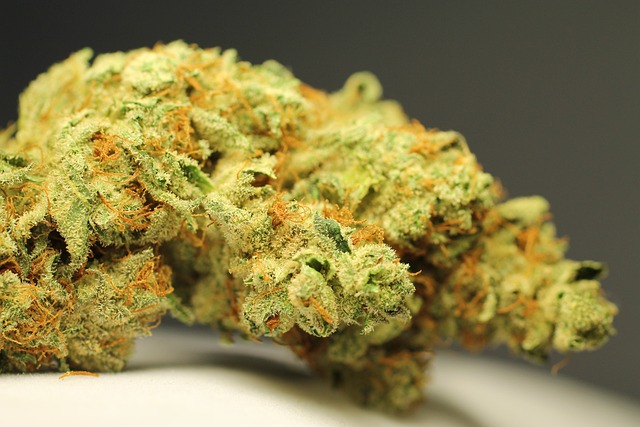THCA (tetrahydrocannabinolic acid), a non-psychoactive cannabinoid found in Cannabis sativa, is gaining popularity as an alternative to traditional THC products, with THCA infused edibles for sale becoming increasingly available on the market. These edibles, such as gummies, chocolates, and baked goods, offer consumers potential health benefits and therapeutic properties like anti-inflammatory, neuroprotective, and analgesic effects without strong psychoactive effects. While THCA is less potent than THC, it can still cause mild psychoactive sensations like euphoria and relaxation, along with side effects including dry mouth, eyes, dizziness, headaches, and mild anxiety or paranoia, which can intensify with higher doses. Individual sensitivity to THCA means that these effects may vary in severity. It's crucial for consumers, especially those with pre-existing health conditions, to consult healthcare professionals before using THCA infused edibles for sale due to potential interactions with medications and health statuses. Ensuring the purchase of these products from reliable sources is essential to ensure potency, purity, and safety, thus maximizing THCA's therapeutic benefits. Consumers should approach THCA infused edibles with caution, considering individual sensitivities and legal regulations, and adhere to responsible use guidelines as research into its properties continues. Transparent labeling from vendors offering THCA infused edibles for sale is key for informed decision-making by consumers.
Exploring the nuanced effects of THCA flower, a non-psychoactive cannabinoid gaining attention in wellness circles, this article sheds light on its potential side effects. With the surge of THCA infused edibles for sale, understanding their efficacy and safety profiles becomes increasingly crucial. We delve into dosage considerations, individual sensitivity, and safe consumption practices to ensure informed usage. This guide aims to empower readers with knowledge to navigate the emerging landscape of THCA products responsibly.
- Exploring the Impact of THCA Flower: A Comprehensive Guide to Potential Side Effects
- The Rise of THCA Infused Edibles for Sale: Understanding the Efficacy and Safety Profiles
- Navigating THCA Side Effects: Dosage, Sensitivity, and Safe Consumption Practices
Exploring the Impact of THCA Flower: A Comprehensive Guide to Potential Side Effects

THCA, or tetrahydrocannabinolic acid, is a non-psychoactive cannabinoid found in the Cannabis sativa plant that is known to convert into THC upon heating. As interest in cannabinoids grows, so does the availability of THCA infused edibles for sale, offering consumers a range of choices beyond traditional cannabis products. It’s crucial to understand the potential side effects associated with THCA consumption to make informed decisions about its use. Consumers may experience mild psychoactive effects from THCA, which can include euphoria and relaxation, but these are generally less intense than those from THC. Common side effects reported with THCA use include dry mouth and eyes, occasional dizziness or headaches, and, in some cases, mild anxiety or paranoia, particularly at higher doses. It’s also worth noting that individual sensitivity to THCA can vary, influencing the severity of these side effects. Those with pre-existing conditions should consult a healthcare professional before incorporating THCA infused edibles into their regimen, as cannabinoids can interact with certain medications and health statuses. Understanding the nuances of THCA’s impact is essential for both seasoned users and newcomers to the world of cannabis products, ensuring a safer and more enjoyable experience with THCA infused edibles for sale. Consumers should always source these products from reputable vendors to ensure potency and purity, reducing the risk of adverse effects and maximizing the benefits associated with THCA consumption.
The Rise of THCA Infused Edibles for Sale: Understanding the Efficacy and Safety Profiles

The emergence of THCA-infused edibles in the marketplace signifies a significant evolution in the cannabinoid product landscape. Tetrahydrocannabinolic acid (THCA), the raw and non-psychoactive precursor to THC, has garnered attention for its potential health benefits and therapeutic properties. As consumers become more informed and discerning, there’s a growing demand for these edibles that promise the entourage effect without the psychoactive impact of delta-9 THC. Manufacturers are responding by offering THCA infused edibles for sale, which encompass a variety of products like gummies, chocolates, and baked goods. These items offer a precise and controlled dosing experience, making them appealing to both novice and experienced users who seek the wellness benefits associated with cannabis without the high.
Understanding the efficacy and safety profiles of THCA-infused edibles is paramount for consumers and regulators alike. Research suggests that THCA may possess anti-inflammatory, neuroprotective, and analgesic properties, which could be beneficial for managing pain, inflammation, and certain neurological conditions. However, as with any consumable product derived from cannabis, safety concerns must be addressed. The variability in the way THCA is processed by different bodies, potential interactions with other medications, and the lack of uniform regulation across regions are factors that contribute to the complexity of assessing efficacy and safety. It’s crucial for consumers to approach these products with an informed perspective, recognizing the potential benefits while being aware of individual sensitivities and legal restrictions. As the market for THCA infused edibles for sale continues to expand, ongoing research will be instrumental in providing clearer guidance on how best to harness their therapeutic potential responsibly.
Navigating THCA Side Effects: Dosage, Sensitivity, and Safe Consumption Practices

When incorporating THCA-infused edibles into one’s regimen, understanding the nuances of dosage and individual sensitivity is paramount for safe consumption. THC Acid (THCA), the raw form of tetrahydrocannabinol (THC), found in cannabis plants before it is heated or decarboxylated, can produce a range of effects that may vary significantly from person to person. The side effects associated with THCA, particularly when ingested through edibles, can include dry mouth and eyes, mild anxiety, and possible psychotomimetic experiences, especially at higher doses. It’s crucial for consumers to start with low dosages to gauge their reaction, as the psychoactive properties of THCA can be potent even before the conversion to THC upon heating.
Factors such as metabolism, tolerance, and personal physiology play a significant role in how an individual will respond to THCA-infused products. Those new to cannabis or those with a low tolerance may experience more pronounced side effects. Conversely, frequent users might not feel the same intensity. It’s advisable to consume THCA infused edibles in a controlled setting and to wait for the effects to fully manifest before considering additional intake. This approach allows for a safer and more enjoyable experience. Consumers interested in purchasing THCA infused edibles should seek out reputable vendors who provide clear labeling of dosages and potential side effects. By adhering to appropriate dosage guidelines and understanding one’s sensitivity, individuals can navigate the effects of THCA-infused products responsibly and safely.
When considering the inclusion of THCA infused edibles for sale into one’s wellness routine, it is imperative to approach this with a full understanding of their potential side effects and how they can be managed. This guide has shed light on the various aspects of THCA flower consumption, from its efficacy and safety profiles to dosage-specific considerations that influence individual responses. As evidenced by the research presented, while THCA infused edibles offer a range of benefits, they are not without their side effects, which can vary widely among users. Prospective consumers should take note of personal sensitivity and adhere to safe consumption practices to optimize their experience with THCA products. With informed decision-making and responsible use, THCA infused edibles for sale can be a valuable addition to one’s health regimen when used appropriately.


